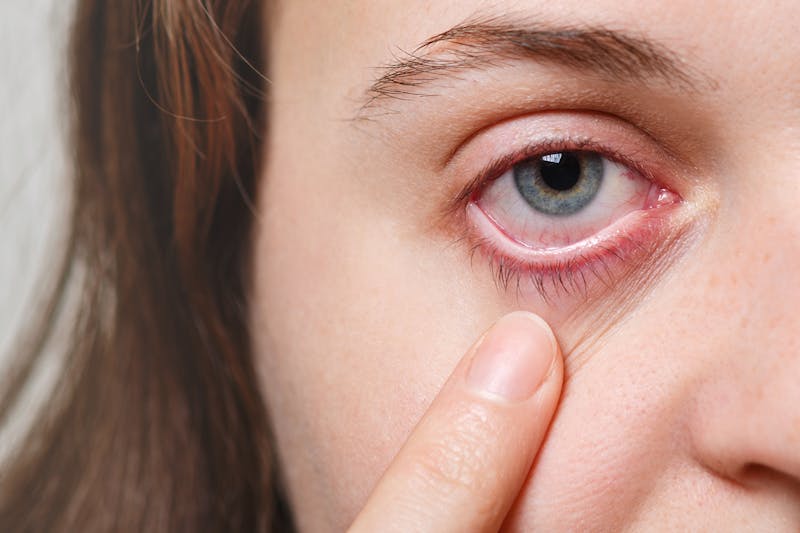
As you look into LASIK surgery, you’ll want to learn as much as you can about what to expect with your procedure. Although LASIK is an incredibly safe procedure that provides consistently excellent results, it’s still important to be aware of any potential side effects. One of the more common side effects of LASIK is dry eyes, but does LASIK surgery cause dry eyes, and will it resolve over time?
Let’s take a look at what dry eye is, how common dry eyes after LASIK surgery are, and what treatment options are available if you have
What is Dry Eye?
Dry eye occurs when your tears are unable to keep your eyes properly lubricated. This condition typically occurs either because your eyes don’t produce enough tears, or because the tears produced are not of the quality required to keep your eyes lubricated. Either way, dry eyes can lead to irritation, inflammation, or damage on the surface of your eyes.
Dry eyes are generally uncomfortable and symptoms can include:
- Burning, scratching, or stinging in your eyes
- Blurred vision
- Difficulty driving at night
- Difficulty wearing contact lenses
- Eye fatigue
- Feeling like there’s something in your eyes
- Light sensitivity
- Red eyes
- Stringy mucus in and around your eyes
Causes of Dry Eyes
Dry eyes can occur as a result of several different causes. External factors can include airline flights, overly air-conditioned spaces, eye surgery, bike-riding without eye protection, or staring at screens for hours at a time. While these are unlikely to cause chronic dry eyes, some people may be more prone to dry eyes in these situations.
For people who experience ongoing issues with dry eyes, it is typically an internal factor. The first is tear film dysfunction. Your tear film contains three layers—aqueous fluid, fatty oils, and mucus. If any layer of your tear film is disrupted by autoimmune diseases, allergies, hormones, or inflamed glands in the eyelid, your eyes are unable to stay properly lubricated. Additionally, decreased tear production can cause dry eyes. You may have decreased tear production because of aging, a medical condition, certain medications, or corneal nerve desensitivity.
Some people also experience excessive tear evaporation, which is usually caused when your meibomian glands become blocked or clogged. This is more common in people with rosacea or other skin disorders, as well as people with conditions like Parkinson’s who blink less often. Eyelid problems may also cause increased tear evaporation, as can eye allergies, preservatives in eye drops, vitamin A deficiency, and external factors like dry air, smoke, wind, or concentrating on certain activities and blinking less.
Risk Factors for Dry Eyes
Some people are more prone to dry eyes in general. There may be several factors that put you at a higher risk for dry eyes, including:
- Being over the age of 50
- Being a woman
- Eating a diet low in vitamin A
- Having a history of refractive eye surgery
- Wearing contacts
If you know you have a history or higher risk of dry eyes, it’s important to discuss this information with your eye doctor to ensure that you’re treating your eyes properly. They may also be able to help give you tips to avoid dry eyes in certain situations, like taking eye breaks while at the computer or using a humidifier.
Does LASIK Surgery Cause Dry Eyes?
It’s important to understand that some people have dry eyes well before having LASIK. Since dry eyes can be caused by any number of factors, from insufficient tear production to allergies to hormones, it’s not uncommon. However, it’s also helpful to know that laser eye surgery can cause dry eyes—particularly while your eyes are healing.
Because LASIK surgery involves cutting a flap in the cornea, some nerves will be cut causing a temporary reduction in sensation in the surface of your eye. Because of this, your eye may not sense that it needs moisture, so it may not produce sufficient tears to keep the eye properly lubricated, resulting in dry eyes. The proper distribution of the eye’s tear film may be temporarily disturbed after LASIK surgery as well, because of the change in the cornea’s shape, which can also cause dry eyes.
To combat dry eyes after LASIK surgery, your eye doctor will prescribe eye drops. You will be expected to use the eye drops on a specified schedule to lubricate the eyes and aid in the healing process. While dry eye is common after LASIK, the majority of patients find that the symptoms are mild and temporary. These symptoms should resolve with time as the eye continues to heal.
Screening for Risk of Chronic Dry Eye After LASIK Surgery
Because some patients already have dry eyes, they may be at a higher risk of chronic dry eye after LASIK surgery, though it is rare. As such, your eye surgeon should complete a thorough screening of your eyes to determine whether or not you are a good candidate for LASIK. While dry eyes don’t always eliminate patients from being eligible candidates, it is an important factor to consider. Dry eye has the potential to impact LASIK surgery outcomes, so identifying the patients at higher risk for chronic dry eye after LASIK surgery is critical.
In order to screen for dry eye, your eye surgeon may use any of the following tests:
- Full eye exam to look at your overall eye health
- Imaging, including keratometers or other instruments, to examine the eye’s tear film
- MMP-9 testing of your tears to identify whether you have high levels of a protein that can exacerbate inflammatory dry eye after LASIK surgery
- Schirmer’s test to measure tear production
- Tear breakup time test to see how tears are distributed over your eye’s surface
Your eye surgeon will get your full health history as well to look for underlying conditions that may impact dry eyes or make you more prone to them. They will also take into account if you live in a dry climate or use medications that dry your eyes significantly. Every eye is different, so while dry eyes are essential to consider, it’s just one factor of many that your surgeon will evaluate in determining whether LASIK is right for you.
How Common Are ?
Immediately following LASIK surgery, dry eyes are quite common and up to 95% of patients will experience some symptoms of dry eyes after the procedure. However, these symptoms are most often temporary and resolve as the eyes heal and the corneal nerves recover. Dry eye symptoms typically peak in the first couple of months after LASIK surgery. After this period, symptoms will continue to improve in the majority of patients for 6-12 months following the procedure.
While dry eyes after LASIK surgery are fairly common, the great news is that, according to the Food and Drug Administration (FDA), most patients continue to see improvement in their dry eye symptoms over time. Even better, this improvement occurs whether patients had dry symptoms before their LASIK procedure or not. This study also found that:
- 60% of patients with dry eye symptoms before LASIK reported that their dry eye symptoms resolved after having a LASIK procedure
- Less than 30% of patients who had no dry eye symptoms before LASIK reported symptoms after the procedure
- 85% of that 30% who experienced new dry eye symptoms after LASIK reported that their symptoms were mild
Another study found that even in patients with pre-existing dry eye symptoms who experienced compromised tear function and increased
Treatment for Dry Eyes After LASIK Surgery
For many patients, treatment for dry eyes after LASIK surgery is the same as it would be for dry eyes in general. Treatment typically begins with preservative-free eye drops, or artificial tears, to keep the eyes lubricated. If these are not sufficient, your eye surgeon will need to determine the best course of action based on your unique eyes. Your treatment for
- Anti-inflammatory medications
- Autologous serum eye drops
- Drinking enough water to maintain your hydration
- Eye patches for sleep
- Prescription eye drops to reduce inflammation
- Punctal plugs to block tear drainage and increase eye moisture
- Taking omega-3 supplements to help maintain and improve your tear film
- Tear-stimulating medications or drops
- Warm compresses and eyelid massage
In most cases, dry eyes after LASIK surgery are temporary, so these interventions will be temporary as well.
Contact us to learn how Dello Russo Laser Vision can provide custom, bladeless LASIK to reduce side effects and improve your vision results. Schedule your free initial consultation to learn how to treat your dry eyes properly to help ensure proper healing and recovery.
